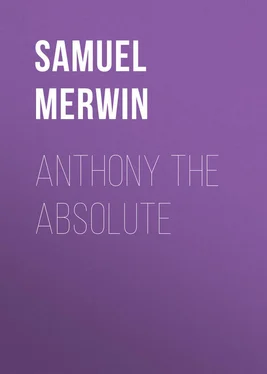Samuel Merwin - Anthony The Absolute
Здесь есть возможность читать онлайн «Samuel Merwin - Anthony The Absolute» — ознакомительный отрывок электронной книги совершенно бесплатно, а после прочтения отрывка купить полную версию. В некоторых случаях можно слушать аудио, скачать через торрент в формате fb2 и присутствует краткое содержание. ISBN: , Жанр: foreign_prose, на английском языке. Описание произведения, (предисловие) а так же отзывы посетителей доступны на портале библиотеки ЛибКат.
- Название:Anthony The Absolute
- Автор:
- Жанр:
- Год:неизвестен
- ISBN:http://www.gutenberg.org/ebooks/52507
- Рейтинг книги:5 / 5. Голосов: 1
-
Избранное:Добавить в избранное
- Отзывы:
-
Ваша оценка:
- 100
- 1
- 2
- 3
- 4
- 5
Anthony The Absolute: краткое содержание, описание и аннотация
Предлагаем к чтению аннотацию, описание, краткое содержание или предисловие (зависит от того, что написал сам автор книги «Anthony The Absolute»). Если вы не нашли необходимую информацию о книге — напишите в комментариях, мы постараемся отыскать её.
Anthony The Absolute — читать онлайн ознакомительный отрывок
Ниже представлен текст книги, разбитый по страницам. Система сохранения места последней прочитанной страницы, позволяет с удобством читать онлайн бесплатно книгу «Anthony The Absolute», без необходимости каждый раз заново искать на чём Вы остановились. Поставьте закладку, и сможете в любой момент перейти на страницу, на которой закончили чтение.
Интервал:
Закладка:
As for what actually did follow, I think I will try to set down just as simply and naturally as I can, reconstructing the curious scene more or less coolly as I recall it now, with my excitement spent and my mind reasonably steady. That is surely the best way, in the case of such an extraordinary occurrence – just write it down and let it go at that.
She was silent for a little time, perhaps standing at her dresser. I wonder if it is like mine, a rickety chest of drawers, sadly in need of paint, with a narrow mirror above it. My mirror is broken in the right-hand lower corner; and at that point I see, instead of the reflection of the dingy room, only an irregular triangle of pine backing. I should like to think that hers is at least a little fresher and brighter, and that the mirror is not broken. These things mean a great deal to a woman, I think. I might have observed all this for myself, doubtless; but at the moment I was too full of the thrill of my discovery to indulge in a single personal thought.
I was still standing there by the door, my left hand quite numb, my feet a little cold from remaining motionless so long, when she began lightly to run over those remarkable exercises of hers.
She began by striking octaves. Her voice flew ever so lightly, yet firmly and surely, from lower a to middle a to upper a . Then the two octaves of a -sharp. Then b . And so on, until she was touching, in that same light, sure way, the d -sharp above high c .
Next she sang an ordinary chromatic scale, no differently from the performance of other singers I have heard excepting perhaps for the remarkable evenness and firmness and pure, floating quality of her pianissimo tone. It was after all this that the remarkable gift that amazed me came to light.
She returned to singing octaves. Only, as if testing and trying her own precision of pitch, she began striking the upper octave note, in making the leap from the lower to the higher, first correctly according to the accepted tempered scale of the Western world, then a fraction of a tone fiat, then a fraction of a tone sharp, then back to the normal octave. She played with, these fractional tones as easily and surely as the ordinary good singer plays with mere semitones. She actually took them in succession, quite as easily as she had, a little earlier, taken the semitones of the chromatic scale.
This was too much. I could not stand still any longer. In all my experience I had never found a white person with anything approaching my fineness of ear in merely hearing close intervals.
But I can not sing them as I hear and know them. I have no voice at all; my vocal chords will not obey my will with any degree of precision. Yet here, in this queer, rather unpleasant little French hotel in the great, barbaric city of Peking, in the next room to mine, is an American woman who can actually sing the intervals that I can only hear.
I knocked on the door.
There was instant and utter silence in the next room.
I knocked again.
She must have been holding her breath. I could not hear so much as the rustle of her skirt.
I spoke, in what I suppose was an excited whisper.
“Please let me speak with you,” I said. “Please let me speak with you!”
Still no sound.
Then it was that I opened the door – the shrunken door that would not lock.
Hôtel de Chine, Peking, April 5th – or 6th
TIS sometime in the very early morning. Peking is still. Even in this rookery of night birds every light is out but mine. I had to stop writing a while back and go for a long hard walk – around the Legation Quarter, outside the walls. But now I shall force myself to write down the rest of it. I shall not go to bed until it is done. It is too absurd that a scientist of proved ability and of highly trained will power should be overcome by his emotions in this way.
I have just tiptoed to the shrunken door that so inadequately separates her room from mine. I heard her irregular breathing: and, while I stood there, caught a low jumble of words spoken with the thick tongue of the sleeper.
And she stirs restlessly in her bed. Even from my chair I can hear that.
But I must tell what happened this afternoon.
I opened her door. I was quite beside myself.
Behind it not quite blocking off the opening, the unpainted, dusty back of her bureau confronted me. I looked through the narrow space between the mirror post and the door frame, and saw her.
She was standing by the foot of the bed.
I laid hands on the creaky old bureau and moved it aside. It was heavy, and it had no castors. I had to exert all my strength, tugging and pushing at it. Then I had to wait a moment to recover my breath.
She was standing rigidly, very white, holding with one hand to the bent iron tube over the foot of the little bed. She has long, slender fingers.
She never moved. Her wide eyes were fixed on me.
The sweat was breaking out on my forehead. A drop fell on the right lens of my spectacles. I took them off and fumbled for my handkerchief. Then I said —
“You have absolute pitch!”
She did not move or speak.
“But that is not all,” I went on, more rapidly. “You have the finest sense of intervals of any one in the world. Excepting myself.”
Her eyes narrowed a very little. And she glanced toward the other door, the one that led into the hall. It seemed to me that her tense muscles relaxed somewhat.
But when I had put on my spectacles and, now quite myself, came forward into the room, she swung back a step and flashed her eyes on me again. And I saw her fingers tighten around the iron tube at the foot of the bed.
This would n’t do. I had frightened her dreadfully. Of course she could n’t possibly know how mistaken she was in this. The thing to do was to explain everything to her.
“My name is Eckhart, Anthony Ives Eckhart,” I began; then paused, thinking that she, being a musical person, might have heard the name. But there was no light of recognition in her eyes.
“You can not imagine what it means to me to find you,” I went on. It seemed to me that from moment to moment she was on the point of interrupting me, so I talked very rapidly, trying at the same time to make my voice and manner as easy and matter-of-fact as possible.
“I have come all the way to China to make phonographic records of Chinese music. I shall make at least two thousand such records, and when I have finished my work will be recognized as the one great contribution to the study of the Oriental tone sense. For I shall secure and preserve on my cylinders the primitive scale intervals that underlie all natural musical expression.”
For some reason this explanation did not seem to get me anywhere. Excepting that now she looked bewildered as well as frightened. But I could not retreat. For here before me was a woman who had the great gift and who could understand. At this thought my mind began racing excitedly ahead. I thought of what she could do for me. And it was so absurdly simple, so little to ask! My forehead was burning now, and the hand that pressed the handkerchief against it was shaking perceptibly. It was a great moment – the greatest, perhaps, in my life.
“God has sent you to me!” I cried, my voice rising and becoming shrill. “I must make you understand!”
She was glancing again toward the hall door. I could n’t make her out at all. But I lowered my voice.
“I must make you understand,” I repeated. “To-day, at the very beginning of my work, I find you. I need you more than anything else in the world – and right now. Yet an hour ago I did not know you existed. It is unbelievable. It is a miracle! I must have a phonographic record of a close-interval scale. For years I have dreamed of securing one. I myself can hear the closest intervals, but I can not sing them. Now you – you – shall sing this scale for me – not the artificial half-tones of our barbarous piano keyboard, but quarter-tones, even eighth-tones. With such a scale, the sounds recorded unerringly on a cylinder from which they can be reproduced at will, we shall at last have an absolute standard for the comparison of all tones and scales. Tell me” – I was trembling with eagerness – “do you think you could sing eighth-tones? Do you think you could?”
Читать дальшеИнтервал:
Закладка:
Похожие книги на «Anthony The Absolute»
Представляем Вашему вниманию похожие книги на «Anthony The Absolute» списком для выбора. Мы отобрали схожую по названию и смыслу литературу в надежде предоставить читателям больше вариантов отыскать новые, интересные, ещё непрочитанные произведения.
Обсуждение, отзывы о книге «Anthony The Absolute» и просто собственные мнения читателей. Оставьте ваши комментарии, напишите, что Вы думаете о произведении, его смысле или главных героях. Укажите что конкретно понравилось, а что нет, и почему Вы так считаете.












